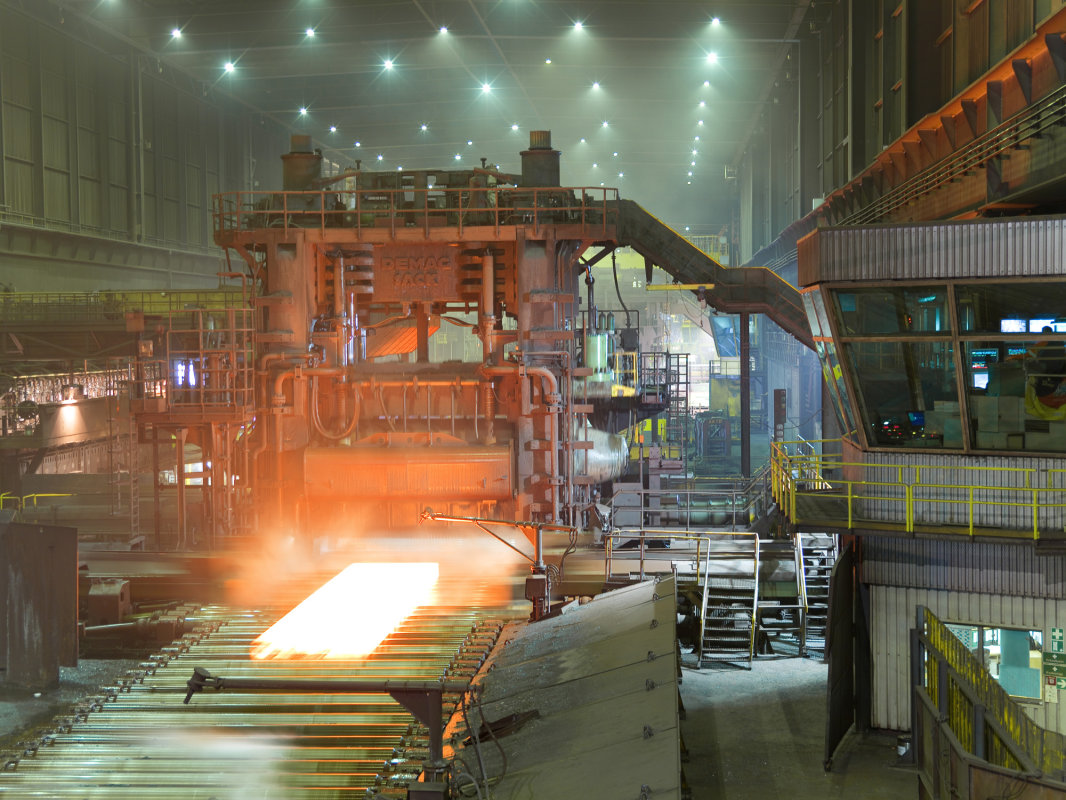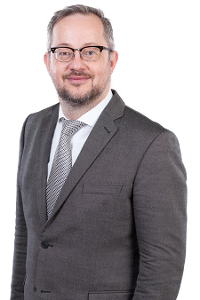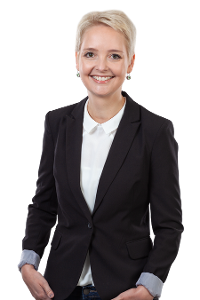
- News & Information
- Press Releases
Another successful partnership between industry and the university
16. May 2018
Saarbrücken mathematicians study the cooling of heavy plate from Dillingen
Already a model for success: In addition to the recently extended partnership with the Materials Science Department at the University of Saarland, AG der Dillinger Hüttenwerke (Dillinger) is supporting another ambitious research project: The Department of Numerical Mathematics at Saarland University is studying the modelling of the cooling process of premium heavy plate at Dillinger. The focus of activity for Mathematics Professor Thomas Schuster and his PhD student Dimitri Rothermel is on the cooling from rolling heat. This is a decisive factor in adjusting the material properties of the steel and therefore in meeting the diverse requirements customers have for the material.
Therefore mathematical models are required to meet increasing customer requirements and to further automate production. Dillinger is supporting the research with a total of 300,000 euros. The project started in 201, the official start of the second project phase was on 1 April 2018.
“A few years ago I was not even aware of how important cooling is for the properties of steel,” recalls Thomas Schuster, professor of numerical mathematics at Saarland University, who started the first phase of the joint project “Inverse Modelling and Simulation of Laminar Cooling Processes” with Dillinger three years ago.
He quickly realized the cooling process is anything but trivial and is not just about cooling the steel so that it can be better stored. “The requirements placed on steel vary greatly from customer to customer,” Prof. Schuster says. Doctoral candidate Dimitri Rothermel offers an example: “A customer might want to build a bridge, so the steel needs to have high toughness and weldability. For another type of steel, such as for the manufacture of an excavator, strength may be more important.”
Dr. Bernd Münnich, Chief Technology Officer at Dillinger, emphasizes the importance of an optimal cooling process for Europe's leading heavy plate manufacturer: “The demands, properties and combinations of properties placed on our steels are becoming more complex all the time. Intelligent cooling can reduce the use of expensive alloying agents – and is therefore also more economical while offering high quality assurance.” Münnich therefore sees a better understanding of the cooling process as an innovation boost for Dillinger.
Up to now, the experts at Dillinger have used a very extensive database – a kind of library – to control the cooling system. It stores many settings of the cooling system that are used for cooling, depending on customer specifications. This library contains process parameters that, however, do not always exactly match the prevailing conditions in the cooling system. If a mathematical model can now be developed based on production and test data that reflects the experience of the experts, the cooling process could be tailored much more precisely to customer specifications.
In a first step, a mathematical model in the form of a nonlinear heat conduction equation was developed between 2015 and March 2018. With this equation it is possible to describe the cooling process mathematically along the entire cooling line, depending on the speed and position in the cooling line. In the second phase now getting started, Thomas Schuster, Dimitri Rothermel and the experts from Dillinger want to find a mathematical basis with which the cooling can be controlled so precisely – depending on the water load and the speed at which the cooling plate passes through – that the desired product properties can be adjusted much more precisely.
Dillinger is funding the project, which will run until September 2019, with a total of 300,000 euros. “That is quite a large sum for mathematics,” Thomas Schuster says. “Unlike materials scientists, for example, we do not need large-scale equipment that can cost six or seven-figure amounts. The most expensive and valuable thing in mathematics is staff positions,” he says. This investment will more than pay for itself if the mathematicians can complete the project successfully. In December 2017, Dillinger also announced it will continue its partnership for another three years with the Department of Materials Science and Engineering at Saarland University and the Steinbeis Forschungszentrum Material Engineering Center Saarland (MECS).
More information:
Department of Numerical Mathematics at the University of Saarland
Prof. Dr. Thomas Schuster
Tel.: +49 681 302 57425
E-Mail: thomas.schuster@num.uni-sb.de

Innovative top-quality steel products, total orientation around our customers' needs and unceasing technological development in close cooperation with our partners form the basis of our success - as they have for more than 333 years.
© 2016 Dillinger All rights reserved.
Contact
AG der Dillinger Hüttenwerke
Werkstraße 1
66763 Dillingen/Saar
Tel.: +49 6831 47 0
Fax: +49 6831 47 2212
E-Mail: info@dillinger.biz
Imprint
| Data privacy statement
| T&C



